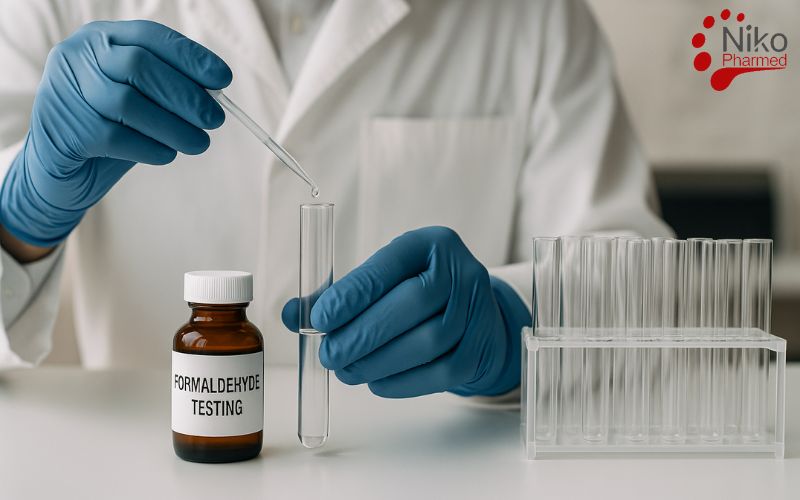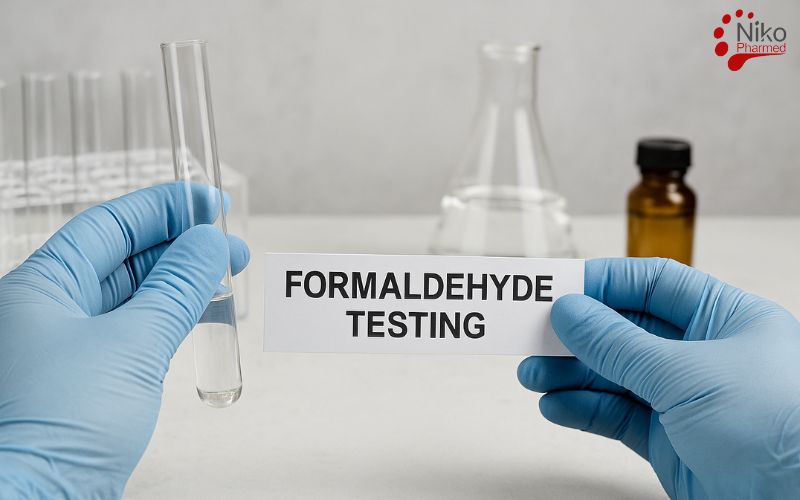What is Formaldehyde Testing?
Formaldehyde testing is the scientific process of quantitatively or qualitatively measuring the concentration of formaldehyde in air, water, building materials, or consumer products to assess compliance with health and safety standards and mitigate potential toxicological risks. In comprehensive chemical safety programs for building materials, toys, cosmetics, and other consumer products, formaldehyde testing is often performed alongside phthalates analysis to assess both volatile and semi-volatile organic contaminants
Formaldehyde Testing Procedure
The formaldehyde testing procedure encompasses a range of scientifically validated analytical methods, each tailored to the sample type, detection sensitivity, and regulatory requirements. While the overarching aim is the precise quantification of formaldehyde, the procedural framework varies depending on the technique employed.
Spectrophotometric Method (Colorimetric Analysis)
This approach typically involves the acetylacetone (Hantzsch) reaction, where formaldehyde in the sample reacts with acetylacetone and ammonium acetate under controlled heating to form a yellow dihydropyridine derivative. The reaction product is then quantified using a UV-Vis spectrophotometer at a specific wavelength (commonly 412 nm). This method offers simplicity and cost-effectiveness, making it suitable for routine water and indoor air assessments, though it is less sensitive than chromatographic techniques.
High-Performance Liquid Chromatography (HPLC)
In this procedure, airborne or liquid-phase formaldehyde is first captured using a DNPH-coated silica cartridge, enabling derivatization into stable hydrazone derivatives. The cartridges are eluted with an organic solvent, and the eluate is injected into an HPLC system equipped with a reverse-phase column and UV detector (typically 360 nm). HPLC offers high specificity and can detect formaldehyde at trace levels, making it a preferred method for regulatory compliance monitoring in occupational and environmental health studies.
Gas Chromatography (GC)
For gas-phase formaldehyde analysis, samples are collected in sorbent tubes or via impinger solutions, followed by derivatization with agents such as pentafluorobenzylhydroxylamine (PFBHA). The derivatives are thermally stable, allowing precise separation on a GC column and detection via flame ionization (FID) or mass spectrometry (MS). GC methods provide excellent selectivity and are particularly suited for complex sample matrices where multiple aldehydes may be present.
Passive Sampling Methods
These utilize diffusion-based badges impregnated with DNPH, requiring no active pump. The exposure period allows formaldehyde to diffuse naturally into the sorbent, after which the analytical steps follow the HPLC or spectrophotometric workflow. This method is advantageous for long-term monitoring in residential and workplace environments.
Across all these procedures, calibration with certified reference materials, method blanks, and replicate measurements are integral to ensuring analytical accuracy and traceability. The choice of method hinges on detection limits, sample complexity, and compliance criteria, allowing for scientifically robust and defensible results in formaldehyde risk assessment.

Nikopharmad Formaldehyde Testing Laboratory
Accreditation and Global Recognition
At Nikopharmad, our Formaldehyde Testing services are backed by ISO/IEC 17025 certification and ILAC accreditation, ensuring strict adherence to globally recognized analytical quality and technical competence standards. These credentials guarantee that our formaldehyde testing results meet the most rigorous international regulatory requirements, recognized by ISO 16000 series, ASTM International, EPA TO-11A, NIOSH, and leading environmental and occupational health authorities worldwide.
Technical Excellence and Validated Infrastructure
Our state-of-the-art analytical facility is equipped with high-performance liquid chromatography (HPLC), gas chromatography (GC), GC-MS, UV-Vis spectrophotometers, and specialized air sampling systems for both active DNPH cartridge methods and passive diffusive sampling. We operate strictly in accordance with validated international methodologies, including ISO 16000-3, ASTM D5197, and NIOSH Method 2016.
Stringent environmental controls, precision-calibrated instruments, and standardized sampling protocols ensure that formaldehyde integrity is preserved from collection to reporting, whether in indoor air, workplace environments, industrial emissions, or material off-gassing studies.
Regulatory-Ready Reporting and Timely Results
In industries where compliance timelines are critical, Nikopharmad provides rapid, accurate, and defensible formaldehyde data. All results are delivered with full method validation records, traceable raw data, and statistical analysis aligned with regulatory submission requirements for OSHA, WHO, EPA, and European Commission standards. Our optimized workflow ensures fast turnaround without compromising accuracy or regulatory compliance, supporting occupational safety audits, product certification, environmental monitoring, and air quality assessments.
Confidentiality and Data Integrity
We maintain the highest levels of client confidentiality and data security. All formaldehyde testing activities are carried out under strict non-disclosure agreements and supported by 21 CFR Part 11-compliant electronic data systems. Each analysis is documented with a complete audit trail, ensuring the traceability, reliability, and integrity of results. Sensitive data, proprietary sampling strategies, and regulatory submissions are handled with uncompromising ethical and professional standards.
Competitive Pricing with Uncompromised Quality
We offer cost-effective formaldehyde testing solutions tailored to the needs of small enterprises, large corporations, and governmental agencies. Our transparent pricing structure enables clients to meet compliance requirements efficiently while upholding international analytical standards and scientific rigor—reducing regulatory approval timelines without compromising result quality.
To request testing or a complimentary consultation contact Nikopharmad
Partner with Nikopharmad for Expert Formaldehyde Testing
By partnering with Nikopharmad, you gain access to a globally accredited laboratory dedicated to scientific excellence, regulatory compliance, and data confidentiality. Whether assessing compliance with workplace exposure limits, monitoring indoor air quality, verifying material emissions, or meeting strict environmental standards, our formaldehyde testing expertise ensures accurate, reliable, and internationally recognized results—helping you achieve compliance faster and with complete confidence.

